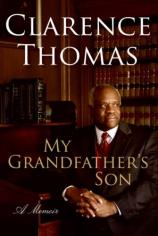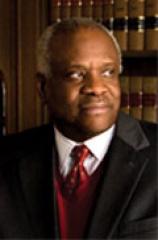My Grandfather’s Son: A Memoir
Review
My Grandfather’s Son: A Memoir
Clarence Thomas is a complex man who rose from a life of
poverty in the segregated Deep South to become an associate justice
on the United States Supreme Court. In his candid memoir, Justice
Thomas chronicles his journey and pays tribute to the one real hero
in his life --- his maternal grandfather.
On June 23, 1948, a sweltering night in Pinpoint, Georgia,
“when the air is so wet that you can barely draw
breath,” Clarence Thomas is born to M.C. and Leola
“Pigeon” Thomas. Delivered by a midwife in his Aunt
Annie’s house, Clarence is, in his mother’s words,
“too stubborn to cry.” Two years later his parents are
divorced and his father moves to Philadelphia, leaving the family
behind.
In the summer of 1955, “without a word of explanation,”
Pigeon sends Clarence and his younger brother Myers to live with
their grandparents. On the morning the boys move in, his
grandfather, whom he calls Daddy, tells them, “The damn
vacation is over.” While almost all other family members
belong to Baptist or other Protestant churches, Daddy is a Roman
Catholic convert. Daddy makes sure the boys are educated in the
structured and disciplined environment of St. Benedict the Moor
Grammar School. At St. Benedict’s Clarence is treated with
respect by the nuns and pushed to do his best. At home he is
expected to pull his load. After graduation, he attends St. Pius X,
Savannah’s only Catholic high school for blacks.
A few months shy of his 16th birthday, Clarence believes he has a
calling to become a priest and transfers to Saint John Vianney
seminary school. Clarence is one of the first African-American
students admitted. After graduation, he and several other
classmates head for Immaculate Conception seminary, near Kansas
City, Missouri. During his time there, Clarence begins to doubt his
vocation. He leaves the seminary, although he knows his decision
will break the promise he made to Daddy not to quit. Shortly after
returning home, Daddy asks him to leave, saying he will probably
turn out like his ‘“no-good daddy or those other
no-good Pinpoint Negroes.’” With nowhere else to turn,
Clarence moves in with his mother. It is 1968 --- a year of riots,
assassinations and disillusion --- the year that he becomes an
“angry black man.”
To prove his daddy wrong, Clarence enrolls in Holy Cross College in
Boston to finish his education. There he meets other black students
who feel disillusioned as he does, and he joins them in protest
demonstrations. Clarence also becomes acquainted with Kathy Ambush,
a student at a nearby Catholic school for women. He decides to
pursue a law degree at Yale, and in 1971, he and Kathy are
married.
When a friend tells him that John Danforth, a Yale Law School
graduate serving as Missouri’s Attorney General, is looking
for other Yalies to work for him, once again Clarence moves to
Missouri --- this time to Jefferson City with Kathy. He works in
the attorney general’s office, where job satisfaction is high
but the salary is not. A few years later he accepts a higher paid
position with Monsanto Chemical Company in St. Louis, but he finds
little job satisfaction there.
After being offered another job working for Danforth, who has
become a U.S. Senator, he and Kathy pack up and head for
Washington, D.C. His connection with Danforth, along with his
reputation and keen mind, gets him noticed by influential
Republicans who see him as a rising star. But on the home front all
is not well. Eventually he and Kathy divorce. He leaves Kathy and
their son Jamal and throws himself into his work, and at times, he
loses himself in a bottle.
Clarence later meets Virginia Bess Lamp. In 1987 she becomes his
second wife and his “pillar of love, strength, and
support.” Her support comes in handy when he is nominated by
President George Bush to fill a vacancy on the United States
Supreme Court. In 1991, after a bitter confirmation hearing that
includes allegations of sexual harassment by Anita Hill, he is
appointed the first black Supreme Court justice.
MY GRANDFATHER’S SON is Clarence Thomas’s deeply
personal and eloquent story of faith, hope and courage. But most of
all it is a loving tribute to his grandfather --- the man whose
hard work, discipline and determination made it possible for a
child born into a life of poverty and segregation to become a
justice on the United States Supreme Court.
Reviewed by Donna Volkenannt on January 12, 2011
My Grandfather’s Son: A Memoir
- Publication Date: October 1, 2007
- Genres: Nonfiction
- Hardcover: 304 pages
- Publisher: Harper
- ISBN-10: 0060565551
- ISBN-13: 9780060565558




